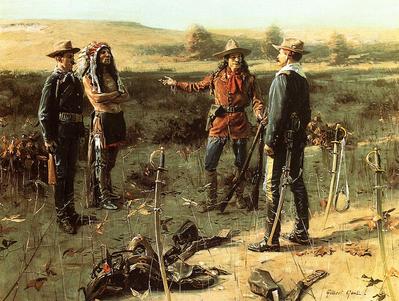
The painting is called The Indian Prisoner, created by William Gilbert Gaul, 1899.
In the scent of plum blossoms,
Ah! the sun appears---
the mountain path.
---Basho
When we have seen Reality, there is not a grain of dust which has not a sublime meaning.
---J. Vanderleeuw
It is like archers. If they start out competing, they'll never become marksmen. It is only long after practice, with no thought of winning or losing, that they can hit the target. Same with the study of the Way. If even a single thought of winning or losing appears, you will be chained by winning and losing.
---Ying-An
In one of the first essays I ever attempted online, I mentioned how I happened to come in contact with the famous folk music collector, Alan Lomax. I said at one point he called me "puritanical" and how stung I was by the remark. http://www.upsaid.com/jazzolog/index.php?action=viewcom&id=5 It still bothers me, but I've soothed myself somewhat with the balmy knowledge that he knew of my New England education---and I was aware of how he felt about New England. I've also tried---and been forced by reality---to ease up on the rigidity of my views of 30 years ago.
I'm glad that at the time I did not begin a range war with Alan, since Texas always was home to him. I doubt any Texans have been called puritanical (unless one happened to be born and educated in New England before relocating----hmmmm) but we do know something about justice in the Wild West. Whether or not the scores of Westerns I saw at the Saturday afternoon matinees gave me an accurate history, I've grown up thinking resentments are a particular weakness in the American fabric. I think we tend to be a people that transfers our problems rather than inventories them in order to change. We go to workshops that teach us to transform failures into opportunities for growth and expansion. We spin.
When I came to Southeast Ohio, I learned that until recently spanking students with big wooden paddles was legal and routine. At first I thought they were joking. No teacher ever laid a hand on me in New York, and I couldn't conceive of it. One time in Lincoln Junior High a science teacher made a kid stand in the corner on his head for a while, but that's the worst I saw. When I worked among people here, who didn't necessarily go beyond the local high school education, I was similarly amazed when they spoke of "beating" their kids, specifically the boys I guess. I didn't think it was my place to ask for details, but I thought maybe again this was a term for strict discipline but not actual physical pain. "Beating their butt" is common parlance around here among many parents.
I've been feeling that during my lifetime the American character has changed markedly and the rest of the world is noticing. Maybe we all were mistaken, having been mislead by World War II propaganda---as Clint Eastwood hints in his film Flags Of Our Fathers. We were the fun-loving Yanks liberating Europe with dollars and chewing gum. If we never were that actually---or even if we were---do others feel we now are vengeful opportunists, motivated essentially by getting more for me and mine? Do we care if injustice is done to others in our name? Do we listen intently to testimonies of people released from our "detention centers" about what was done to them for years---or don't we want to hear about it? Have we gone off the deep end and become cruel?
I've worried about this and tried to deal with it personally, convince myself the behaviors I endure everyday by others driving cars are just momentary. The aggression will fade away when the war on terror is won and we all return to normal. But maybe it's something more permanent, a trend not so easily reversed.
And so it was this morning I came upon an article in the Boston Review. Well, maybe Boston is the best place to review an oppressive morality! The title is simply Why Are There So Many Americans In Prison?, and was compiled by Glenn C. Loury who is the Merton P. Stoltz Professor of the Social Sciences in the department of economics at Brown University. A 2002 Carnegie Scholar, he brings very recent statistics to bear on how Americans are using punishment to solve problems.
http://bostonreview.net/BR32.4/loury.html

No comments:
Post a Comment